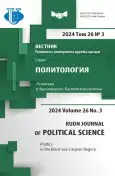Black Sea, Caspian, and Central Asian Regions in Global Processes of Political Development: Introducing the Issue
- Authors: Zhiltsov S.S.1
-
Affiliations:
- Diplomatic Academy of the Ministry of Foreign Affairs of the Russian Federation
- Issue: Vol 26, No 3 (2024): Politics in the Black Sea-Caspian Region
- Pages: 455-465
- Section: EDITORIAL ARTICLE
- URL: https://journal-vniispk.ru/2313-1438/article/view/322415
- DOI: https://doi.org/10.22363/2313-1438-2024-26-3-455-465
- EDN: https://elibrary.ru/BKKXQZ
- ID: 322415
Cite item
Abstract
The common viewpoint, widely shared in the academic literature, is that the role of the Black Sea, Caspian, and Central Asian regions is increasing and contributes to the dynamic development of the countries that are part of them. Indeed, amid global transformations taking place in the world, the position of these regions, as well as individual states, has changed significantly. However, the analysis of this issue is impossible without a profound assessment of the policies of extra-regional actors: their role in determining the development of the area and their influence on political and economic processes in individual states. The extra-regional actors have often shaped the essence of development taking place in the Black Sea, Caspian, and Central Asian regions along with the nature of intra-regional processes. In the meantime, external actors have consistently integrated the Caspian, Black Sea and Central Asian states into global political processes, logistic and energy projects. As a result, the countries of these zones were given a subordinate role. Although these states developed their own ambitious geopolitical projects and long-term development programs, nevertheless, the results of more than 30 years of development of the Black Sea, Caspian, and Central Asian regions point to their increased dependence not only on extra-regional actors but also on the processes taking place in global politics and economy. The system approach allowed the authors to determine the importance of the Black Sea, Caspian, and Central Asian regions for extra-regional actors, assess their contribution to world politics and global economy, to identify potential directions of their development.
About the authors
Sergey S. Zhiltsov
Diplomatic Academy of the Ministry of Foreign Affairs of the Russian Federation
Author for correspondence.
Email: sergej-z71@yandex.ru
ORCID iD: 0000-0002-4898-2627
Doctor of Political Science, Professor, Head of the Department of Political Science and Political Philosophy
Moscow, Russian FederationReferences
- Aydin, M. (2004). oil. Pipelines and Security: The Geopolitics of the Caspian region. In M. Gammer (Ed.), The Caspian Region, Volume 1: A Re-Emerging Region (1st ed.). routledge. https://doi.org/10.4324/9780203005118
- dunaeva, E.V. (1999). Caspian region and Iran. In Islamic Revolution in Iran: Past, Present, Future (pp. 129–137). Moscow: Institute of oriental Studies of the russian Academy of Sciences. (In russian).
- Garbuzarova, E.G. (2022). Central Asia in the Foreign Policy of Turkey and Iran. Moscow: Aspect Press. (In russian).
- Grozin, A.V. (2000). Hangover of Turanism. The Caspian as the Epicenter of Possible Crises of the 21st Century. Vestnik Kaspiya, 6, 24–31. (In russian).
- Kechagias, A.E. (2023). Between China and the Mediterranean: detecting Intercultural Communication Before the Silk road. In G. Herrera-Franco, S. Kostopoulou, J. Wood, K. Al-Kodmany (Eds.), Cities’ Vocabularies and the Sustainable Development of the Silkroads. SRSTDCH 2021. Advances in Science, Technology & Innovation. (pp. 117–127). Springer: Cham. https://doi.org/10.1007/978-3-031-31027-0_10
- Malysheva, d.B. (2002). Russia and the Caspian region: Problems of development security. Moscow: IMEMo. (In russian).
- Markelov, K.A. (2020). The concept of the “Greater Caspian” in the context of the geopolitical dimension. Modern science and innovation, 2, 114–123. https://doi.org/10.33236/2307910X-2020-2-30-105-113 (In russian).
- Nazarbayev, N.A. (2003). Critical decade. Almaty: Atamura.
- Pisarev, V.d. (1999). US policy in the Caspian region. In V.V. Zhurkin & et al. (Eds.), Europe and Russia: Problems of the Southern Direction. The Mediterranean-Black Sea-Caspian. Moscow. (In russian).
- roman, V.S. (2002). Geopolitical Factors in the Trends of Economic development of the Caspian region. The Caspian — a Place of Clash of Interests. In United Caspian: International Cooperation, Problems of Economic and Social Development of the Region (рp. 34–45). Astrakhan. (In russian).
- Sasley, B. (2004). The Intersection of Geography and resources: Geopolitics in the Caspian Sea Basin. In l. Tchantouridze (Ed.), Geopolitics: Global Problems and Regional Concerns. Winnipeg: Center for defense and Security Studies. University of Manitoba.
- Shmelev, N.P., Guseinov, V.A., & Yazkova, AA. (Eds.). (2006). The Mediterranean — Black Sea — Caspian: Between Greater Europe and the Greater Middle East. Moscow. (In russian).
- Viktorin, V.M. (2002). Caspian areas as a specific Eurasian borderland. Caspian region: politics, economics, culture, 1, 40–46. (In russian).
- Vinokurov, E., Akhunbaev, A., et al. (2022). Economy of Central Asia: A new look. reports and working papers 22/3. Almaty, Bishkek, Moscow: Eurasian development Bank. (In russian).
- Voitolovsky, G.K., & Kosolapov, N.A. (1999). Features of the geopolitical situation in the Caspian region. In Europe and Russia: Problems of the southern direction. (pp. 307–322). Moscow: INTErdIAlECT+. (In russian).
- Zhiznin, S.Z. (2000). US Energy diplomacy. USA and Canada, 2, 72–94. (In russian).
- Zhiltsov, S.S., & Zonn, I.S. (2009). USA in Pursuit of the Caspian. Moscow: International relations. (In russian).
- Zhiltsov, S.S. (2016). Political processes in Central Asia: Features, problems, prospects. Central Asia and the Caucasus, 19(1), 23–31. (In russian).
Supplementary files









